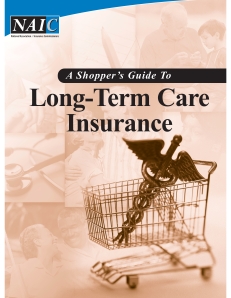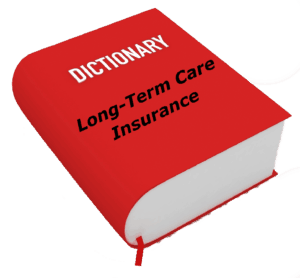Long-term care includes a variety of services that may be both medically and/or non-medically necessary for people with a chronic illness or disability. Health and personal needs are met through long-term care. Generally speaking, long-term care provides people assistance with activities of daily living, such as bathing, dressing, eating, toileting or transferring. People of all ages may need long-term care.
People pay for long-term care in a variety of ways. These include: using the personal resources of individuals or their families, long-term care insurance, and some assistance from Medicaid for those who qualify. Medicare, Medicare supplement insurance, and the health insurance you may have at work usually will not pay for long-term care.
Individual Personal Resources
Individuals and their families generally pay for part or all of the costs of long-term care from their own funds. Many use savings and investments. Some people sell assets, such as their homes, to pay for their long-term care needs.
Medicare
Medicare’s skilled nursing facility (SNF) benefit does not cover most nursing home care. Medicare will pay the cost of some skilled care in an approved nursing home or in your home, but only in specific situations. The SNF benefit only covers you if a medical professional says you need daily skilled care after you have been in the hospital for at least three days and you are receiving that care in a nursing home that is a Medicare-certified skilled nursing facility. While Medicare may cover up to 100 days of skilled nursing home care per benefit period when these conditions are met, after 20 days beneficiaries must pay a coinsurance fee. In 2008, that coinsurance was $128 per day. While Medicare may pay for nursing home care sometimes, it doesn’t cover the costs of care in assisted living facilities. While many people would like to receive care in their own homes, Medicare does not cover homemaker services. In addition, Medicare doesn’t pay for home health aides to give personal care unless you are homebound and are also getting skilled care, such as nursing or therapy. The personal care must also relate to the treatment of an illness or injury, and you can only get a limited amount of care in any week. You should not rely on Medicare to pay for your long-term care needs.
Long-Term Care Insurance
Long-term care insurance is one other way you may pay for long-term care. This type of insurance will pay or reimburse you for some or all of your long-term care. It was introduced in the 1980s as nursing home insurance but has changed a lot and now covers much more than nursing home care. The rest of this Shopper’s Guide will give you information on long-term care insurance.
A Partnership Qualified Policy is a type of policy that allows you to protect (keep) some of your assets if you apply for Medicaid after using your policies benefits.
Illinois Long-Term Care Partnership Program (Public Act 095-0200) was passed in August 2007 a public-private partnership between states and private insurance companies. It is the intent of this program to reduce future Medicaid costs for long-term care by delaying or eliminating dependence on Medicaid by providing incentives for individuals to insure against the cost of providing for their long-term care needs.
For more information about long-term care insurance, the Illinois Department of Insurance recommends the following consumer guide:
For further assistance, please contact
Scott A. Olson at 877-727-9582
or email Scott at Scott@LTCShop.com
Illinois License #: 617232



